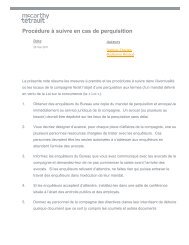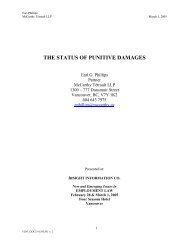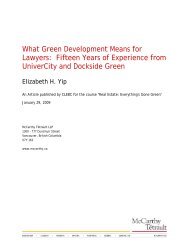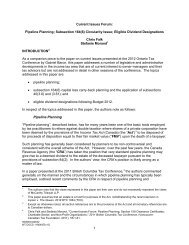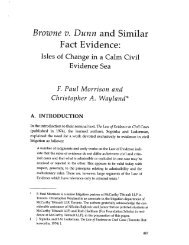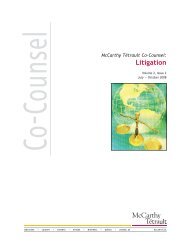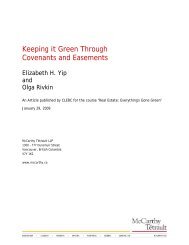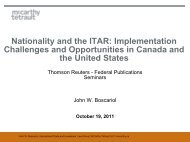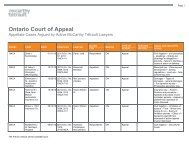The Doctrine of Public Policy in Canadian Contract Law
The Doctrine of Public Policy in Canadian Contract Law
The Doctrine of Public Policy in Canadian Contract Law
You also want an ePaper? Increase the reach of your titles
YUMPU automatically turns print PDFs into web optimized ePapers that Google loves.
<strong>The</strong> <strong>Doctr<strong>in</strong>e</strong> <strong>of</strong> <strong>Public</strong> <strong>Policy</strong> <strong>in</strong> <strong>Canadian</strong> <strong>Contract</strong> <strong>Law</strong> 145<br />
Supreme Court <strong>of</strong> Canada to underlie the Charter.228 In seek<strong>in</strong>g to give effect<br />
to these values through the doctr<strong>in</strong>e <strong>of</strong> public policy, the courts may therefore<br />
be seen as secur<strong>in</strong>g the possibility <strong>of</strong> justice <strong>in</strong> contract law itself.<br />
<strong>The</strong> reader will note that the preced<strong>in</strong>g account does not address those<br />
heads <strong>of</strong> public policy, such as cohabitation contracts, contracts to broker a<br />
marriage, or ma<strong>in</strong>tenance and champerty agreements, which have already been<br />
(or are on the way towards be<strong>in</strong>g) abandoned. This is so because the theory that<br />
public policy reflects the preconditions <strong>of</strong> a just society need not also assume<br />
that the concept <strong>of</strong> the just society is itself immutable. Indeed, if it did, it would<br />
be unable to expla<strong>in</strong> why public policy has been limited to its specific categories<br />
(and thus meet the criticism <strong>of</strong> uncerta<strong>in</strong>ty), while at the same time acknowledg<strong>in</strong>g<br />
the variance <strong>of</strong> the doctr<strong>in</strong>e throughout history (and thus preserve its<br />
vitality). Rather, the theory <strong>of</strong> public policy advanced here<strong>in</strong> takes as its further<br />
premise the hermeneutical fact that any vision <strong>of</strong> a just society is conditioned<br />
by the historical reality and socio-political <strong>in</strong>stitutions from which it is projected.229<br />
Thus, <strong>in</strong> response to W<strong>in</strong>field's claim that "public policy is emphatically<br />
no ideal standard to which law ought to conform,"230 we would state that<br />
although public policy does reflect an ideal standard, it is an idealism which is<br />
itself fundamentally historical.<br />
228 In R. v. Oakes, [1986] 1 S.C.R. 103, [1986] S.C.J. No. 7 at para. 64, Dickson C.J. stated<br />
that "[a] second contextual element <strong>of</strong> <strong>in</strong>terpretation <strong>of</strong> s. 1 is provided by the words<br />
`free and democratic society'. Inclusion <strong>of</strong> these words as the f<strong>in</strong>al standard <strong>of</strong> justification<br />
for limits on rights and freedoms refers the Court to the very purpose for which<br />
the Charter was orig<strong>in</strong>ally entrenched <strong>in</strong> the Constitution: <strong>Canadian</strong> society is to be free<br />
and democratic. <strong>The</strong> Court must be guided by the values and pr<strong>in</strong>ciples essential to a<br />
free and democratic society which I believe embody, to name but a few, respect for the<br />
<strong>in</strong>herent dignity <strong>of</strong> the human person, commitment to social justice and equality, accommodation<br />
<strong>of</strong> a wide variety <strong>of</strong> beliefs, respect for cultural and group identity, and faith<br />
<strong>in</strong> social and political <strong>in</strong>stitutions which enhance the participation <strong>of</strong> <strong>in</strong>dividuals and<br />
groups <strong>in</strong> society. <strong>The</strong> underly<strong>in</strong>g values and pr<strong>in</strong>ciples <strong>of</strong> a free and democratic society<br />
are the genesis <strong>of</strong> the rights and freedoms guaranteed by the Charter and the ultimate<br />
standard aga<strong>in</strong>st which a limit on a right or freedom must be shown, despite its effect,<br />
to be reasonable and demonstrably justified" [emphasis added]. See also Health Services<br />
& Support-Facilities Subsector Barga<strong>in</strong><strong>in</strong>g Assn. v. British Columbia, 2007 SCC 27 at<br />
para. 81, stat<strong>in</strong>g that "[h]uman dignity, equality, liberty, respect for the autonomy <strong>of</strong> the<br />
person and the enhancement <strong>of</strong> democracy are among the values that underly the<br />
Charter." <strong>The</strong> connection between Charter values and the categories <strong>of</strong> public policy<br />
has not been lost upon commentators. In Grattan, supra note 60 at 534, the authors state<br />
pla<strong>in</strong>ly that public policy is "shaped by, among other th<strong>in</strong>gs, Charter values. <strong>The</strong> doctr<strong>in</strong>e<br />
acts as a vessel for channell<strong>in</strong>g constitutional protections <strong>in</strong>to private law."<br />
229 For <strong>in</strong>stance, the existence <strong>of</strong> a common religious and moral system such as Christianity<br />
(and its attendant <strong>in</strong>stitutions, such as marriage) may have at one time been understood<br />
to constitute a precondition <strong>of</strong> a just society, but is antithetical to such a society <strong>in</strong> the<br />
context <strong>of</strong> a modern liberal democracy that is characterized by the fact <strong>of</strong> reasonable<br />
pluralism. See further Rawls, supra note 224 at 14-15. <strong>The</strong> impact <strong>of</strong> chang<strong>in</strong>g social<br />
conditions <strong>in</strong> this sense may be observed <strong>in</strong> McIntyre, supra note 120.<br />
230 W<strong>in</strong>field, supra note 1 at 99.



